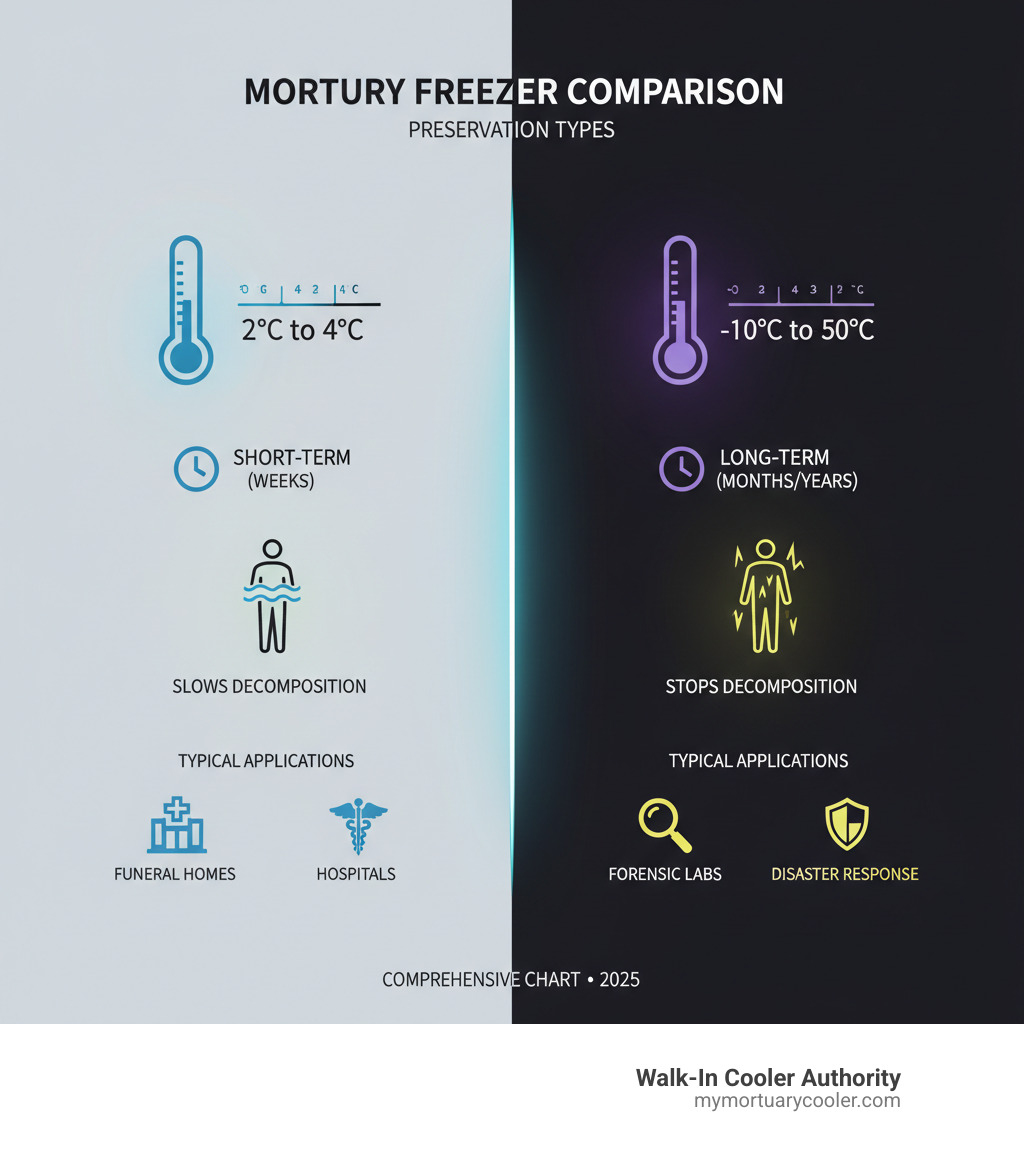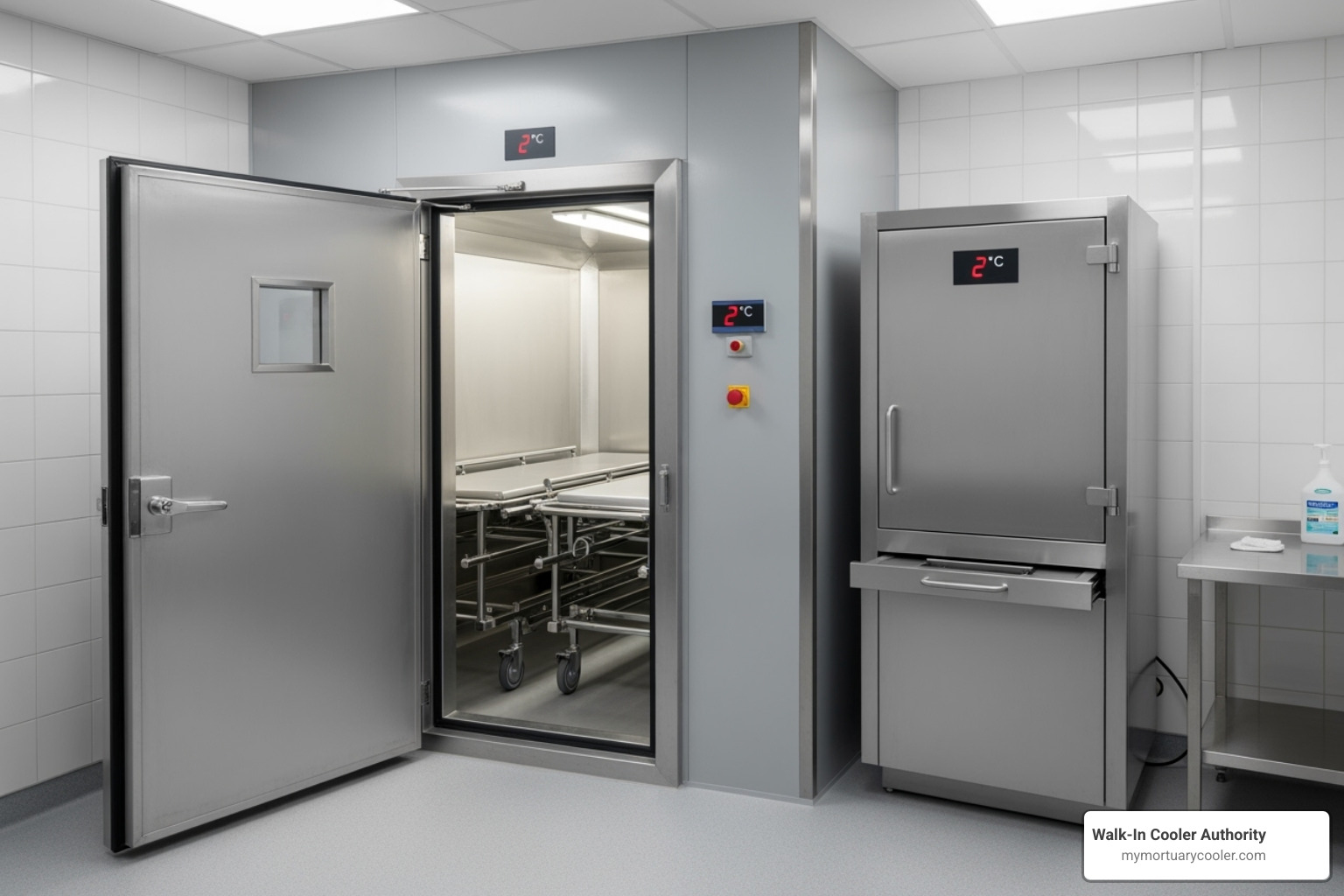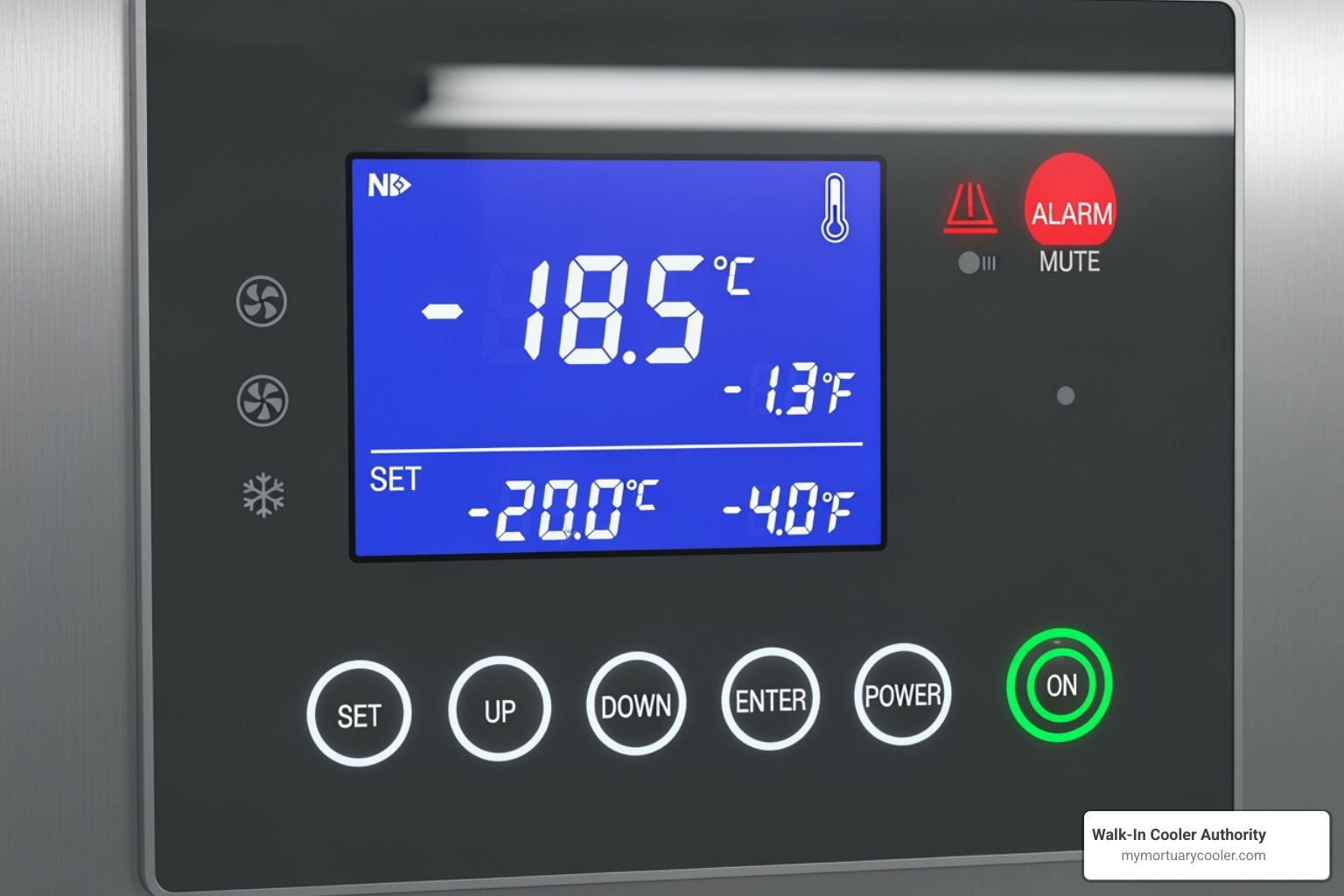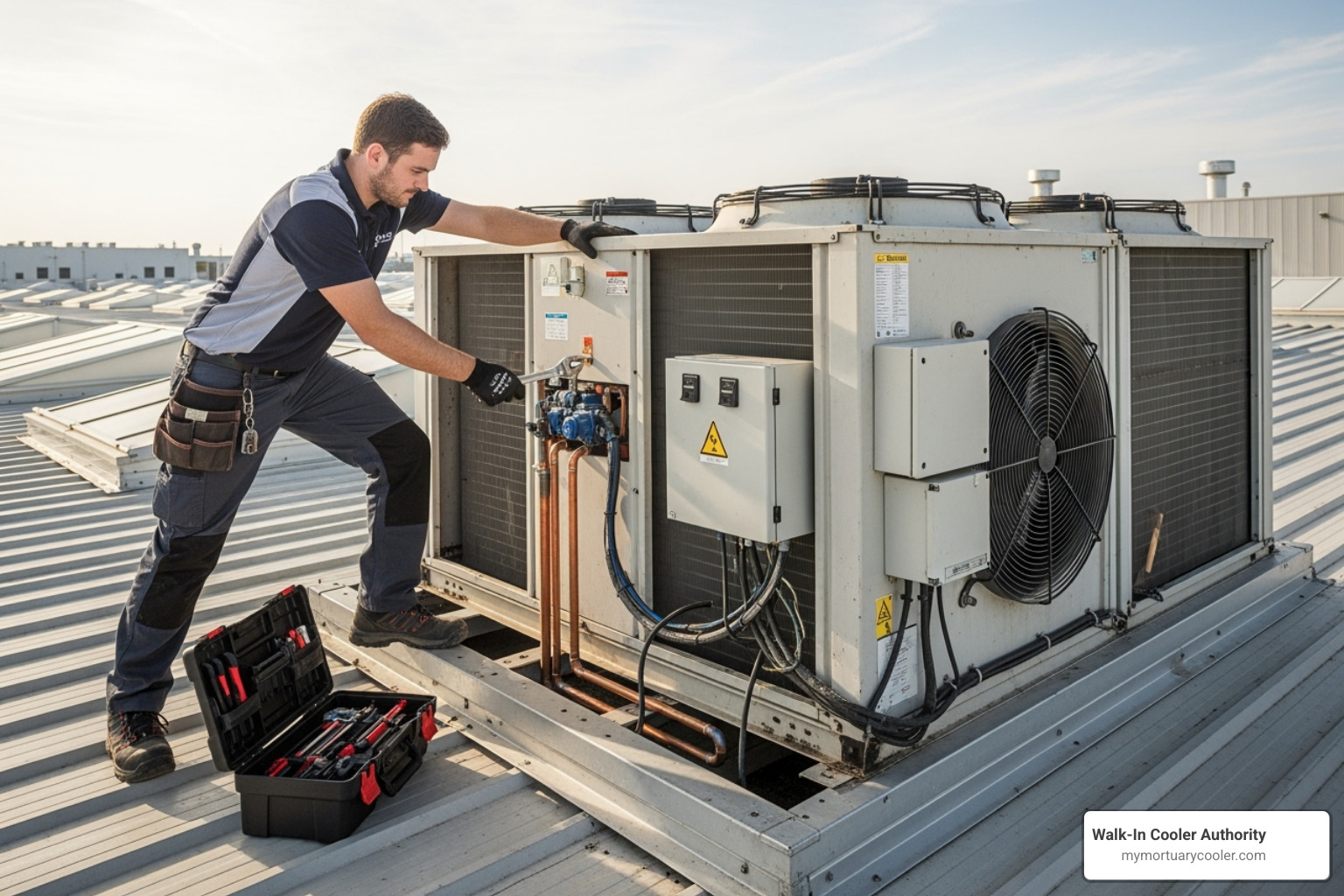Understanding Mortuary Freezer Technology and Applications
A mortuary freezer is a specialized refrigeration unit designed to store deceased bodies at controlled low temperatures to slow decomposition and maintain dignified preservation. These essential units operate in two main temperature ranges:
Positive Temperature Units (2°C to 4°C)
- Short-term storage lasting several weeks
- Slows but doesn't stop decomposition
- Most common in funeral homes and hospitals
Negative Temperature Units (-10°C to -50°C)
- Long-term preservation and forensic storage
- Freezes bodies to significantly reduce decomposition
- Used primarily in forensic institutes
Common Applications:
- Funeral homes and crematoriums
- Hospital morgues
- Forensic laboratories
- Military and disaster response facilities
The primary purpose of mortuary refrigeration is preserving body integrity while families make arrangements or investigations are completed. Modern units feature stainless steel construction, individual cooling systems, and digital temperature controls with alarms.
Temperature control remains critical - as one industry expert notes: "The temperature of mortuary storage cabinet remains between 1°C to 5°C but in some cases it may go freezing side such as 0°C, -10°C and even -20°C that can also be designed as per individual requirement."
These systems come in various configurations including walk-in coolers for high-capacity facilities, compact body box units for space-limited locations, and mobile units for emergency response.

Types of Mortuary Refrigeration Systems
Choosing the right cadaver storage solution can feel overwhelming with so many options available. The good news? Each system is designed with specific needs in mind, making your decision easier once you understand the basics. Whether you're storing bodies for a few days or preserving them for forensic investigations, the right mortuary freezer ensures dignity, compliance, and smooth operations.
For those just getting started, our comprehensive guide on Body Fridge: Everything You Need to Know About Mortuary Refrigeration covers all the fundamentals you need to know.

Positive vs. Negative Temperature Refrigerators
The most important choice you'll make is temperature range. This single decision determines how long you can store bodies and what condition they'll be in when you need them.
Positive temperature units keep things cool but not frozen, maintaining temperatures between 2°C to 4°C (36°F to 39°F). Think of these as your everyday workhorses - they slow decomposition significantly, giving you several weeks to work with. Most funeral homes and hospitals rely on these units because they handle the majority of their storage needs perfectly.
Negative temperature units are the heavy-duty option, plunging temperatures down to -10°C to -50°C (14°F to -58°F). These true mortuary freezers actually freeze bodies, stopping decomposition in its tracks. They're essential for forensic labs and any situation requiring long-term storage.
| Feature | Positive Temperature Units | Negative Temperature Units |
|---|---|---|
| Temperature Range | 2°C to 4°C (36°F to 39°F) | -10°C to -50°C (14°F to -58°F) |
| Storage Duration | Days to several weeks | Months to years |
| Decomposition | Slows significantly | Stops completely |
| Best For | Funeral homes, hospitals | Forensic labs, long-term storage |
| Primary Use | Short-term storage, arrangements | Investigations, research |
The choice between positive and negative temperature really comes down to your timeline and purpose. For most facilities, positive temperature units handle day-to-day operations beautifully. But when you need to preserve evidence integrity or store bodies for extended periods, negative temperature units become indispensable.
For a detailed comparison of these systems, check out our article Mortuary Freezer vs. Morgue Refrigerator: Essential Insights.
Form Factors: Walk-In, Body Box, and Mobile Units
Size matters when it comes to mortuary refrigeration, and thankfully, there's a perfect fit for every facility.
Walk-in coolers are the spacious solution for high-capacity needs. Built with modular panels, these units maximize your storage space efficiently. You can easily expand them as your facility grows, and the modular design makes installation and future modifications straightforward. These units can accommodate dozens of bodies with proper racking systems, making them ideal for larger morgues and busy funeral homes.
Body box units (also called cadaver lockers) are perfect when space is tight or you need smaller capacity. These compact units range from 1-12 body capacity and can often be stacked to make the most of your available floor space. Each compartment typically has its own cooling system, so if one section needs maintenance, the rest keep working normally.
Mobile morgue solutions provide flexibility when you need it most. These trailer-mounted units can be deployed quickly for disaster response, temporary capacity increases, or emergency situations. They're a lifesaver during busy periods or unexpected circumstances when your regular storage reaches capacity.
The beauty of mobile units is their versatility - they can serve temporary needs without the commitment of permanent installation. For more details on these adaptable solutions, read our Mobile Morgue Solutions: A Quick Start Guide.
Specialized Units for Forensics and Transplants
Some applications demand more than standard storage - they require precision preservation that maintains critical integrity.
Forensic preservation goes beyond simply slowing decomposition. These specialized mortuary freezers must maintain evidence integrity, preserving trace materials, tissue samples, and other crucial evidence that could make or break an investigation. The precise temperature control ensures that forensic examinations can be conducted months or even years later with reliable results.
Organ preservation for transplants represents another critical application. These units maintain internal organs at optimal temperatures to preserve their viability for life-saving transplant procedures. The controlled environment keeps organs fresh and ready for surgical implantation, directly impacting the success rates of these critical procedures.
Maintaining body identifiability becomes crucial in complex cases where identification is delayed. The controlled environment prevents physical changes that might hinder identification efforts, ensuring that families can find closure and authorities can complete their investigations properly.
These specialized applications require what we call "dead serious storage solutions" - equipment that meets the highest standards for both justice and medical procedures. Learn more about these critical applications in our guide Dead Serious Storage Solutions for Morgues and Forensics.
Key Features to Look for in a Mortuary Freezer
Selecting the right mortuary freezer is one of the most important decisions you'll make for your facility. It's not just about keeping things cold - you're investing in equipment that preserves dignity, ensures compliance, and keeps your operations running smoothly for years to come.
The key to making an informed choice lies in evaluating specifications carefully and understanding which features truly matter. From construction materials that can handle daily use to advanced safety systems that protect your staff, every detail counts. For a complete overview of what to consider, our Morgue Fridge Guide: Complete Overview of Cadaver Refrigeration for Hospitals & Funeral Homes walks you through everything you need to know.

Construction, Materials, and Sanitation
When it comes to mortuary freezer construction, you want equipment built to last. The materials and design choices directly impact how long your unit will serve you and how easy it'll be to maintain proper hygiene standards.
Stainless steel is the gold standard for good reason. Specifically, thick gauge Stainless Steel 304 offers exceptional resistance to corrosion and wear - exactly what you need in a demanding mortuary environment. As our research confirms, "Mortuary refrigerators are typically constructed of stainless steel in order to maintain durability and ensure ease of cleaning." Each unit features thick gauge stainless steel 304 with a thick layer of PUF insulation, creating a robust shell that protects your investment.
The interior design is just as crucial. Seamless fiberglass interiors eliminate those hard-to-clean cracks and crevices where bacteria love to hide. Combined with anti-microbial finishes, these smooth surfaces make thorough sanitization much easier - and more effective.
Look for units with NSF approval, which means they meet strict public health standards. This certification isn't just a nice-to-have; it's your assurance that the equipment meets rigorous sanitation requirements. You can find additional guidance on refrigeration standards through resources like the Florida Building Code Information.
Polyurethane Foam (PUF) insulation deserves special mention. This high-quality insulation maintains stable internal temperatures while dramatically improving energy efficiency. A thick layer of PUF insulation means your refrigeration system won't have to work overtime, saving you money on energy costs while ensuring consistent performance.
Choosing the Right Mortuary Freezer Capacity and Racking
Getting the capacity right involves more than just counting how many bodies you need to store. You'll want to consider your body trays, accessibility needs, and room for growth as your facility expands.
Mortuary freezers come in a wide range of capacities to match different facility needs. Smaller units might handle just 1 body, 2 bodies, or 3 bodies - perfect for clinics or smaller funeral homes. Mid-range options include 4-body, 6-body, 8-body, and 12-body units that work well for most hospitals and funeral homes. For high-volume facilities, walk-in coolers can accommodate up to 50 bodies or more with the right racking system.
The racking system inside your unit makes all the difference in how efficiently you can use the space. Body trays made from stainless steel provide a stable, easy-to-clean surface for loading and unloading. Roll-in carts make moving bodies much easier on your staff's backs, while telescoping slide rails allow smooth, safe access to individual trays without disturbing others.
Cantilever storage racks help you maximize vertical space in walk-in units, creating more storage without expanding your footprint. And don't forget about bariatric storage options - with increasing needs in this area, specialized units and reinforced trays ensure you can safely and respectfully accommodate all body sizes.
Advanced Technology and Safety Features
Modern mortuary freezers aren't just cold boxes anymore. They're sophisticated systems packed with technology designed to keep your operations running smoothly and your staff safe.
Individual cooling systems represent a major advancement in reliability. Instead of one system cooling the entire unit, each chamber has its own refrigeration system and temperature controller. This means if one compressor fails, the other chambers keep running normally. As our research notes, "Individual refrigeration systems and temperature controllers for each chamber offer energy efficiency and prevent complete unit breakdown if one system fails, allowing continued use of other chambers."
Digital temperature controls give you the precision you need. Microprocessor-based PID controllers with clear LED displays let you set and monitor temperatures accurately. Even better, these systems include audio-visual alarms that immediately alert you to temperature deviations, power failures, or open doors.
Safety features are non-negotiable in this equipment. OSHA compliance ensures your unit meets workplace safety standards. Safety release handles allow anyone accidentally locked inside to easily open the door from the interior - a critical safety feature. Heated door jambs prevent ice buildup around seals, ensuring doors seal properly and don't freeze shut.
Additional standards, like those outlined by the Texas Department of Insurance Cooler/Freezer Standards, help ensure your equipment meets all necessary safety and operational requirements.
Energy Efficiency and Customization
Nobody wants sky-high energy bills, and modern mortuary freezers are designed with efficiency in mind. At the same time, your equipment should fit your facility's specific needs - not the other way around.
Energy efficiency starts with high R-value insulation. That thick PUF insulation we mentioned earlier prevents thermal leakage, so your refrigeration system doesn't have to work as hard. Modern efficient compressors use less energy to maintain target temperatures, while LED lighting consumes less power and generates less heat than traditional bulbs.
The real efficiency comes from individual cooling systems that only cool chambers actually in use. This smart design can significantly reduce energy consumption, especially in larger units. Our large-capacity outdoor units are specifically designed to "expand storage space while reducing energy costs."
Customization options let you tailor your mortuary freezer to your exact needs. Various metal finishes help your equipment blend with your facility's aesthetic. Door options include front-loading, side-loading, and specialized entry configurations. Advanced digital and programmable controls give you precise temperature management.
Dehumidifier systems help control humidity levels, while PMS color matching for exterior panels - often at no additional charge - ensures your equipment looks like it belongs in your space. As our research confirms, "Our units can be custom to your specifications and feature various metal finishes, door options, alarm systems, refrigeration controls, and dehumidifier systems."
This level of customization ensures your mortuary freezer becomes an integrated part of your facility, not just another piece of equipment taking up space. For more insights on optimizing your storage setup, check out Freeze Frame: A Guide to Body Storage Freezers.
Maintenance and Operational Considerations
Think of your mortuary freezer as a trusted partner in your daily operations. Just like any relationship, it needs regular attention and care to perform at its best. The good news? With proper maintenance and smart operational practices, these units are built to serve you reliably for years to come.

Routine Cleaning and Upkeep
Keeping your mortuary freezer clean isn't just about appearances - it's about maintaining the dignity and respect that families deserve during difficult times. The stainless steel construction we use makes this job much easier than you might expect.
Daily sanitation protocols should become second nature to your staff. The beauty of stainless steel surfaces is that they wipe clean easily with standard disinfectants. No scrubbing required, no hidden corners where bacteria can hide. It's designed to make your life simpler.
Door seals deserve special attention because they're working hard every day. These rubber gaskets create the tight seal that keeps temperatures stable and energy costs down. A quick visual check during your daily routine can spot small tears or wear before they become big problems. When gaskets start looking worn or feel loose, it's time for a replacement - your energy bill will thank you.
The seamless fiberglass interiors in our units eliminate those annoying cracks and crevices where bacteria love to hide. This means less time scrubbing and more confidence in your sanitation efforts. For deeper insights into maintaining your cold storage system, check out our guide on Mortuary Cold Storage Systems: What You Should Know.
Maintenance Best Practices for Your Mortuary Freezer
Here's where a little prevention saves a lot of headaches. Regular maintenance isn't glamorous, but it's what keeps your mortuary freezer running smoothly when you need it most.
Listen to your compressor - it's trying to tell you things. During quiet moments, take a second to hear how it sounds. A healthy compressor runs with a steady hum. Unusual noises, excessive vibration, or constant cycling could signal trouble brewing. Catching these early saves both money and stress.
Refrigerant levels need professional attention, but the signs of low refrigerant are things you can notice. If your unit is working harder to maintain temperature or your energy bills creep up, it might be time for a technician to check things out. Never attempt refrigerant work yourself - it requires special certification and equipment.
Temperature accuracy matters more than you might think. Over time, thermostats can drift slightly, showing 38°F when it's actually 42°F inside. Annual calibration ensures your digital displays tell the truth. This isn't just about compliance - it's about maintaining optimal preservation conditions.
Defrost cycles in applicable units need to run on schedule. Ice buildup on coils makes your system work harder and less efficiently. If you notice ice where it shouldn't be, or if defrost cycles seem too frequent, have a technician adjust the timer settings.
Professional servicing twice a year keeps small issues from becoming big problems. A qualified refrigeration tech can clean coils, check electrical connections, and spot potential failures before they happen. Think of it as an insurance policy for your peace of mind.
The bottom line? Your mortuary freezer is built to last, but it performs best with regular care. A little attention today prevents emergency service calls tomorrow.
Frequently Asked Questions about Mortuary Freezers
When it comes to mortuary freezers, we understand that making the right choice involves answering some important questions. Over the years, we've helped countless facilities steer these decisions, and certain questions come up again and again. Let's tackle the most common ones together.
What is the ideal temperature for storing a body?
The perfect temperature for your mortuary freezer really depends on how long you need to store bodies and what you're using them for. Think of it like choosing between your regular refrigerator and your freezer at home - each serves a different purpose.
For short-term storage lasting anywhere from a few days to several weeks, you'll want to stick with positive temperatures between 2°C to 4°C (that's about 36°F to 39°F). This range works beautifully for slowing down decomposition while maintaining the body's dignity for viewings, identification, or transport arrangements. Our research shows that most mortuary storage cabinets operate "between 1°C to 5°C," which gives you that sweet spot for most funeral home and hospital needs.
For long-term preservation or forensic work where you need bodies stored for months or even years, you'll need negative temperatures ranging from -10°C to -50°C (14°F to -58°F). These freezing temperatures essentially put decomposition on pause, which is exactly what forensic investigators and research facilities need.
Here's something interesting - we often set our mortuary freezer units to -2°C as a standard, but we can absolutely adjust this based on your specific requirements. The key is matching the temperature to your intended use.
How are mortuary freezers installed?
Installing a mortuary freezer might seem daunting, but we've designed our process to be as smooth as possible. Most of our units use prefabricated modular panels, which makes everything much more manageable.
The beauty of modular design is that it "ensures easy assembly, disassembly for relocation or expansion." This means if you ever need to move or expand your facility, your investment moves with you.
Site preparation is where everything starts. We need to make sure your floor is level and can handle the weight of the unit. You'll also need adequate space around the unit for both assembly and future maintenance, plus proper ventilation to keep everything running smoothly.
For walk-in units, our technicians assemble the panels right on your site, creating that perfectly insulated storage space. Smaller body box units often arrive mostly put together, which speeds up the process considerably.
The electrical requirements are pretty straightforward but important. Most units need dedicated circuits with the right voltage and amperage. We always recommend having a professional electrician handle this part - it's not the place to cut corners.
Professional installation is something we strongly encourage for all mortuary freezer units. Our experienced technicians make sure everything is properly assembled, sealed, and calibrated. It's like having a master chef prepare your meal - sure, you could do it yourself, but why risk it when expertise is available?
Are mortuary freezers energy-efficient?
This is probably one of our most popular questions, and for good reason - nobody wants to see their electricity bill skyrocket. The good news is that modern mortuary freezers are designed with energy efficiency as a top priority.
High-quality insulation is the foundation of efficiency. We use thick PUF (polyurethane foam) insulation because it's incredibly effective at keeping the cold in and the heat out. As our specifications note, "Each unit is designed with thick gauge of stainless steel 304 with thick layer of PUF insulation." Think of it as a really good winter coat for your freezer.
Advanced compressor technology makes a huge difference too. Modern compressors are much more efficient than older models, using less power while maintaining those critical stable temperatures your facility depends on.
LED lighting might seem like a small detail, but it adds up. LED lights use significantly less energy than traditional bulbs and generate much less heat, which means your refrigeration system doesn't have to work as hard.
Here's where things get really smart - individual cooling systems for multi-body units are a game-changer. Instead of cooling empty chambers, the system only works on occupied spaces. Our research confirms that "Individual refrigeration systems and temperature controllers for each chamber offer energy efficiency." It's like only heating the rooms in your house that you're actually using.
Outdoor units deserve special mention because they're designed to "expand storage space while reducing energy costs" by taking advantage of cooler outdoor temperatures when available.
While mortuary freezers do run continuously (they have to, given their critical role), these efficiency features significantly reduce both your environmental impact and operational costs. It's technology that makes sense for both your budget and your conscience.
Conclusion: Selecting the Right Mortuary Storage Solution
When it comes to choosing the right mortuary freezer, you're making a decision that goes far beyond simple equipment selection. This choice directly impacts your facility's operational efficiency, your ability to maintain the dignity of those in your care, and your compliance with essential safety regulations.
Throughout this guide, we've walked through the landscape of mortuary refrigeration together. We've explored how positive temperature units serve most funeral homes and hospitals with their 2°C to 4°C range, while negative temperature systems provide the deep freeze necessary for long-term forensic work and extended preservation needs.
We've also examined the different forms these systems take. Walk-in coolers offer maximum capacity and flexibility for larger facilities. Compact body box units provide efficient solutions when space is at a premium. And mobile morgue solutions deliver critical temporary storage during emergencies or peak demand periods.
The features we've discussed matter tremendously in real-world operations. Stainless steel construction ensures both durability and ease of cleaning. Digital temperature controls with alarms provide the precision and safety monitoring that regulatory compliance demands. Individual cooling systems offer redundancy that prevents total system failure when you need reliability most.
Energy efficiency isn't just good for your budget - it's increasingly important for environmental responsibility. Modern mortuary freezers with high-quality insulation, LED lighting, and smart cooling systems can significantly reduce operational costs while maintaining optimal preservation conditions.
Perhaps most importantly, customization options ensure your equipment fits your facility's unique needs. Whether you need specific door configurations, particular finishes, or specialized racking systems, the right solution adapts to your requirements rather than forcing you to adapt to it.
As Walk-In Cooler Authority, we understand that this equipment represents more than just refrigeration - it's about providing dignified care and maintaining the highest professional standards. Our OSHA-compliant equipment meets stringent safety requirements while our direct-sales approach helps facilities access premium solutions without premium markups.
The best mortuary freezer for your facility will seamlessly match your capacity requirements, operational demands, and budget constraints. It will integrate smoothly into your workflows while ensuring compliance with all relevant regulations.
Take time to carefully consider the factors we've outlined in this guide. Think about your current needs and potential future growth. Consider the importance of redundancy, energy efficiency, and ease of maintenance in your specific situation.
When you're ready to explore your options, we're here to help you steer the selection process. Find the right mortuary freezer for your facility and find how the right equipment can improve both your operational efficiency and your ability to serve families during their most difficult times.
















